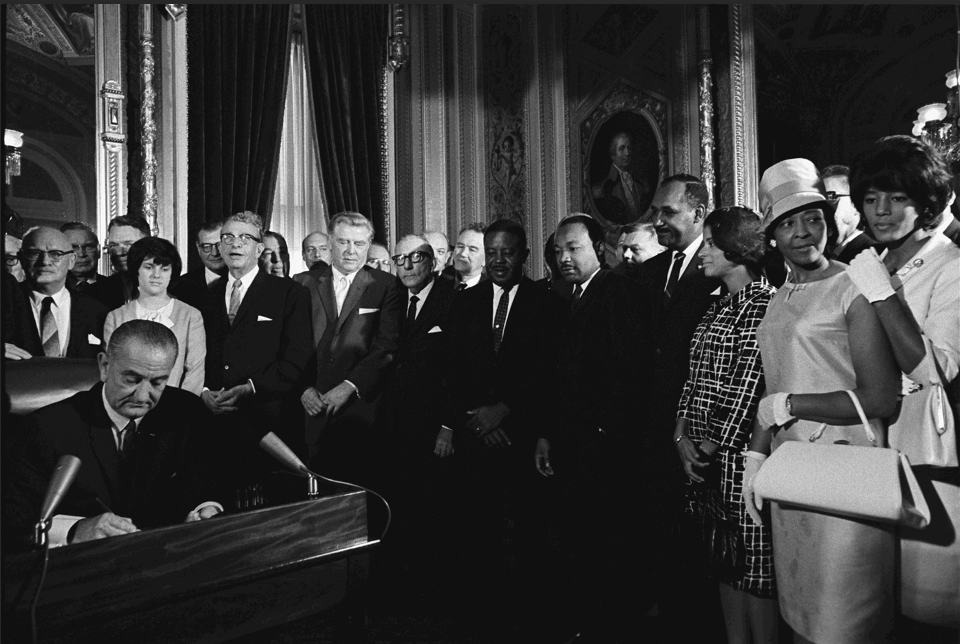
On this day 57 years ago, the Voting Rights Act was signed into law by then-President Lyndon B. Johnson at the height of the Civil Rights Movement. This historic piece of legislation is often cited as changing the scope of American democracy, doing so to ensure the voices of all, regardless of race, faith, gender, or disability were heard throughout the electoral process. Today, we honor the hard work and sacrifice of the men and women who made this possible.
Since the birth of this country, the ideals of freedom and representation have been what sets the democratic system in the United States apart from the rest of the world. The notion of one person/one vote, a key feature of a representative democracy, is what gives citizens access to the inner-workings of government. Yet, while the right to vote was included in the United States Constitution, it remained a luxury afforded to a very exclusive few. The first election held in 1789 for example, consisted only of wealthy white men casting their vote, thus excluding around 94% of the population.
The history of voting rights in the United States unfortunately does not follow a linear path, with groups achieving rights only for them to be prevented from expressing them in other ways. The aftermath of the Civil War saw the abolition of slavery under the 13th Amendment and additionally brought with it the 14th and 15th Amendments. These Amendments were responsible for granting citizenship to all born and naturalized within the U.S and provided equal protections under the law, including the right to vote. However, up until 1965, individual states were allowed to decide what made their residents eligible to express this right at their own discretion.
While voter disenfranchisement was prevalent across the nation as a  whole, many Southern states passed particularly restrictive legislation that at face value appeared “color blind.” Yet, by design were nothing more than mere attempts to suppress African-American civic engagement. Captured within Jim Crow Laws, it was commonplace for those attempting to register to vote to be bombarded with questions and tasks before even receiving an application. Hopeful registrants could expect to undergo literacy tests, be asked to provide a reference of “good character,” supply proof of property ownership, or generally be met with hostility and intimidation.
whole, many Southern states passed particularly restrictive legislation that at face value appeared “color blind.” Yet, by design were nothing more than mere attempts to suppress African-American civic engagement. Captured within Jim Crow Laws, it was commonplace for those attempting to register to vote to be bombarded with questions and tasks before even receiving an application. Hopeful registrants could expect to undergo literacy tests, be asked to provide a reference of “good character,” supply proof of property ownership, or generally be met with hostility and intimidation.
Brought on through tireless civil rights protest, the Voting Rights Act was passed in 1965 following the series of marches from Selma to Montgomery and the events of Bloody Sunday, where Congressman John Lewis, among dozens of others, were bloodied by police dispatched to break up their peaceful demonstration. In the immediate aftermath of this historic piece of legislation, tactics of voter suppression were subsequently removed and by the end of 1965, 250,000 new African-American citizens were registered to vote. In the state of Mississippi alone, African-American voter registration rates increased from 6.7% in 1965 to 59.8% in the two years following. Statistics similar to this were echoed all across the South as many African-American voters registered and cast their ballots, free from restrictions for the first time.
On this day of celebration, let us take a moment to honor the legacy of the many courageous men and women who, in the face of injustice, worked tirelessly to make political participation accessible for all. Yet 57 years on, there is still much work to be done. We as nonprofits must ensure the communities we serve have equal access to the polls and aren’t discouraged, disenfranchised or inhibited by an onerous registration process, restrictive voter ID laws, or partisan gerrymandering. We must also work to educate voters on what their rights are as citizens, and ensure there is proper infrastructure in place to get people registered and to the polls. Therefore, join us as we celebrate voting rights, and work to turn these rights into action!




